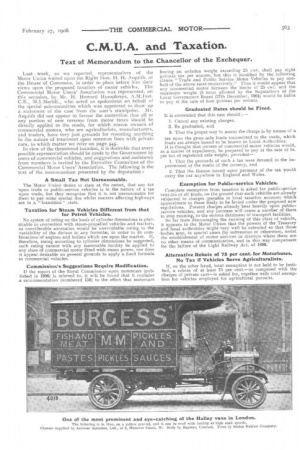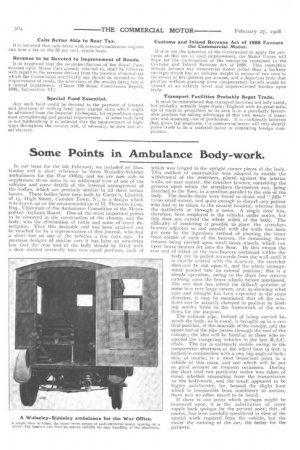C.M.U.A. and Taxation.
Page 23

Page 24

If you've noticed an error in this article please click here to report it so we can fix it.
Text of Memorandum to the Chancellor of the Exchequer.
Last week, as we reported, representatives of the Motor Union waited upon the Right Hon. H. H. Asquith, at the House of Commons, in order to place before him their views upon the proposed taxation of motor vehicles. The Commercial Motor Users' Association was represented, on this oocasion, by Mr. H. Howard Humphreys, A.M.Inst. C.F., M.I.MechE., who acted as spokesman on behalf of the special sub-committee which was appointed to draw up a statement of the case from the user's standpoint. Mr. Asquith did not appear to favour the contention that all or any portion of new revenue from motor taxes should be directly applied to the roads, for which reason owners of commercial motors, who are agriculturists, manufacturers, and traders, have very just grounds for resenting anything in the nature of treatment upon common lines with private cars, to which matter we refer on page 545.
In view of the threatened taxation, it is desirable that every possible representation should be made to the Government by users of commercial vehicles, and suggestions and assistance from members is invited by the Executive Committee of the Commercial Motor Users' Association. The following is the text of the memorandum presented by the deputation :
A Small Tax Not Unreasonable.
The Motor Union desire to state at the outset, that any tax upon trade or public-service vehicles is in the nature of a tax upon trade, but they recognise that it is not unreasonable for them to pay some special due whilst matters affecting highways are in a. "transition' state.
Taxation for Steam Vehicles Different from that for Petrol Vehicles.
No system of rating on the basis of cylinder dimensions is practicable in connection with steam-propelled vehicles and tractors, as considerable anomalies would be unavoidable owing to the variability of the divisor in any formulm, in order to fit combinations of engines and boilers which are upon the market. If, therefore, rating according to cylinder dimensions be suggested, such rating cannot with any reasonable facility be applied to any class of commercial motor fitted with steam power, nor does it appear desirable on general grounds to apply a fixed formula to commercial vehicles.
Commission's Suggestions Require Modification.
If the report of the Royal Commission upon motorcars (published in 1906) is referred to, it will be found that it contains a recommendation (numbered 156) to the effect that motorcars
having an unladen weight exceeding 25 cwt. shall pay eight guineas tax per annum, but this is modified by the following clause " Trade and Public Service Motor Vehicles to pay onehalf of the above rates respectively." Thus it would appear that any commercial motor between the limits of 26 cwt. and the maximum weight (5 tonal allowed by the Regulations of the Local Government Board (27th December, 1904) would be liable to pay at the rate of four guineas per annum.
Graduated Rates should be Fixed. It is contended that this rate should :— 1. Cancel any existing charges.
2. Be graduated, and
3. That the proper way to assess the charge is by means of a tax upon the gross axle loads transmitted to the roads, which loads are always bound to be known to Local Authorities. It is thought that owners of commercial motor vehicles would, as a matter of expediency, be prepared to pay at the rate of 5s. per ton of registered axle weight, provided
1. That the proceeds of such a tax were devoted to the improvement of the roads of the country, and 2. That the license issued upon payment of the tax would carry the car anywhere in England and Wales.
Exemption for Public-service Vehicles.
Complete exemption from taxation is asked for public-service vehieles of all kinds, on the ground that such vehicles are already subjected to charges (payable to local taxation account) which approximate to those likely to be levied under the proposed new regulations. Present charges already bear heavily upon publicservice vehicles, and any increase will cause a number of them to stop running, to the serious detriment of transport facilities. So far from discouraging the running of this class of vehicle, it appears to the Motor Union that the powers of the Treasury and local authorities might very well he extended so that those bodies may, in special cases (by subvention or otherwise), assist the establishment of motor services in districts where there are no other means of communication, and in this way compensate for the failure of the Light Railway Act, of 1896.
Alternative Rebate of 75 per cent. for Motorbuses. No Tax if Vehicles Serve Agriculturalists.
If, on the other hand, total exemption is not held to be justified, a rebate of at least 75 per cent—as compared with the charges of private cars—is asked for, together with total exemption for vehicles employed for agricultural pursuits.
Cabs Better Able to Bear Tax.
It is believed that cabs fitted with interna,-combustion engines can bear a tax on the 50 per cent, rebate basis.
Revenue to be Devoted to Improvement of Roads.
It is suggested that the recommendations of the Royal Commission upon Motor Cars already referred to, shall be followed with regard to the revenue derived from the taxation of motorcars which the Commission specifically say should be devoted to the improvement of roads, the allocation of the monies being left to a central department. (Clause 159 Royal Commission Report, 1906, Sub-section VI.)
Special Fund Essential.
Any such fund could be devoted to the payment of interest and provision of sinking fund upon capital sums which might be advanced from the Imperial Exchequer, for expenditure upon road strengthening and general improvement. If some such fund is not forthcoming it is believed that the improvement of highways throughout the country will, of necessity, be slow and unsat'sfactory.
Customs and Inland Revenue Act of 1888 Favours the Commercial Motor.
If it is not the intention of the Government to apply the pro. cesds of this tax to road improvement, the Motor Union will hope for the continuation of the exemption contained in the Customs and Inland Revenue Act of 1888. This exemption already favours any commercial motor (other than a hackney can iage) which has an unladen weight in excess of two tons to the extent of five guineas per annum, and a departure from that pod.Con without granting some compensatory benefit would be viswed as an entirely novel and unprccetiented burden upon trade.
Transport Facilities Probably Beget Trade.
It must be remembered that transport facilities not only assist, but probably actually beget trade; England with its great mileage of roads in proportion to its area is in a peculiarly favourab!e position for taking advantage of this new means of transport and lessening cost of production. It is confidently believed that, given fair treatment, t!-e commercial motor will very shortly prove itself to be a material factor in combating foreign competition.




























